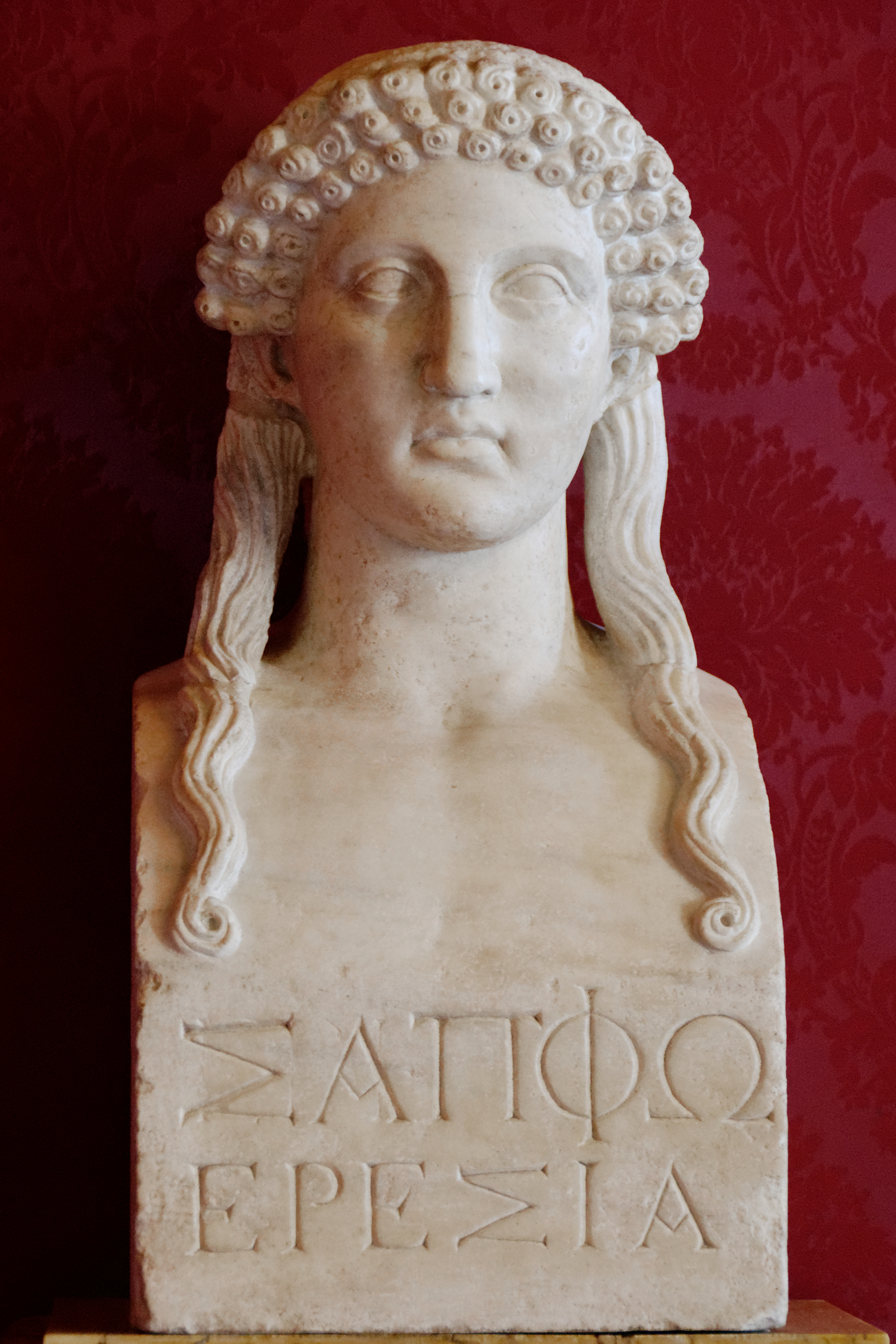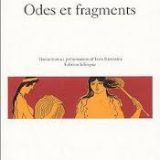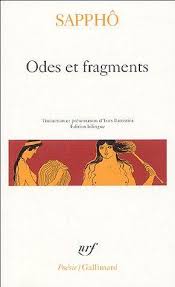Odes – Sappho – 620-520 BCE
Reviewed by: Michael Sympson Date: 5 May 2002
“if you are squeamish don’t prod the beach rubble”
Sappho (* before 610 Ý c.580 BC.) translated by Mary Barbnard
Sappho never fails to create the emotional incident around the passion of love from the symptoms which accompany it in real life. And wherein does she show her excellence? In the skill with which she selects and combines the most striking and intense of those symptoms.
That Man …
That man is peer of gods, who
face to face sits listening
to your sweet speech and lovely
laughter.
It is this that rouses a tumult
in my breast. At mere sight of you
my voice falters, my tongue
is broken.
Straightway, a delicate fire runs in
my limbs, my eyes
are blinded and my ears
thunder.
Sweat pours out: a trembling hunts
me down. I grow
paler than grass and lack little
of dying.
by Sappho (* before 610 Ý c.580 BC.)
tr. William Carlos William (1883-1963) ¹
 Is it not wonderful how she summones at the same time, soul, body, hearing, tongue, sight, colour, all as though they had wandered off apart from herself? She feels contradictory sensations, freezes, burns, raves, reasons — for one that is at the point of death is clearly beside herself. She wants to display not a single emotion but a whole congress of emotions. Lovers all show symptoms as these, but what gives supreme merit to her art, as I said the skill with which she chooses the most striking and combines them into a single whole. It is, I fancy, much in the same way that the poet in describing storms picks out the most alarming circumstances.
Is it not wonderful how she summones at the same time, soul, body, hearing, tongue, sight, colour, all as though they had wandered off apart from herself? She feels contradictory sensations, freezes, burns, raves, reasons — for one that is at the point of death is clearly beside herself. She wants to display not a single emotion but a whole congress of emotions. Lovers all show symptoms as these, but what gives supreme merit to her art, as I said the skill with which she chooses the most striking and combines them into a single whole. It is, I fancy, much in the same way that the poet in describing storms picks out the most alarming circumstances.
It is the year of the Lord 1073. The two churches celebrate. Pope Gregory VII, the celibate campaigner, and his counterpart in Constantinople, the patriarch Constantine Psellus agree to end the schism. Needless to say, that it didn’t last; the Greek Orthodox Church would not stand for impositions from the Vatican. But for the time being it was honeymoon. In both Capitals the clergy immolated the “idolatrous and lewd” legacy of an ancient sorceress and what was believed to be of one of her numerous lovers.
Pope Gregory VII in Rome and Michael Cerularius and Constantine Psellus in Constantinople destroyed simultaneously 11.000 verses of Sappho and Alceius, and thus obliterated, what had escaped till then the Norman raiders, Attila the Hun, the Byzantine iconoclasm, numerous fires and earthquakes and the neglect of the copyists. A continuous tradition of 1650 years had come to an end. May the names of the holy arsonists be remembered in infamy.
 Back in 580 BC we find ourselves in a provincial, deceptively idyllic situation. Across the Aegean and further south, towards the ports of Palestine, the Jewish state just breathed her last. Jeremiah ended his life as a refuge in Egypt and a young shaman who used to bake his bread over his own turds (Ezek. 4:12) took his first commissions from his Babylonian overlord. Babylon was the cosmopolitan hub of the world, the oyster in heaven, but the skies were high and Babylon far beyond the horizon.
Back in 580 BC we find ourselves in a provincial, deceptively idyllic situation. Across the Aegean and further south, towards the ports of Palestine, the Jewish state just breathed her last. Jeremiah ended his life as a refuge in Egypt and a young shaman who used to bake his bread over his own turds (Ezek. 4:12) took his first commissions from his Babylonian overlord. Babylon was the cosmopolitan hub of the world, the oyster in heaven, but the skies were high and Babylon far beyond the horizon.
The Greek neighborhood was a loquacious lot, apparently forever divided in blood feuds between aristocratic clans and self-made tyrants who held a precarious mandate based on referenda and silent support by the commoners in tiny townships. Democracy had not been invented yet, continual vendettas and frequent banishments paused only briefly, when the Greek manhood assembled in Olympia. Being a Greek meant to be young and fit and in an unending competition for this one moment of fame.
A time of austere pleasures:
Don’t ask me what to wear
I have no embroidered
headband from Sardis to
give you Cleis, such as
I wore
and my mother
always said that in her
day a purple ribbon
looped in the hair was thought
to be high style indeed
but we were dark: a girl
whose hair is yellower than
torchlight should wear no
headdress but fresh flowers …
 We know very little about Sappho’s life: she grew up and died on Lesbos, an island with steep slopes and sweltering olive groves and a ceaseless surf running flat at the fatigued beaches. There is an orthodox monastery high up in the hills, clusters of cats survey the blazing scene from the whitewashed garden walls and from the stepping stones of winding village lanes. The people are friendly, and tourists are invited to photograph a marble quarry which had been abandoned at Sappho’s time.
We know very little about Sappho’s life: she grew up and died on Lesbos, an island with steep slopes and sweltering olive groves and a ceaseless surf running flat at the fatigued beaches. There is an orthodox monastery high up in the hills, clusters of cats survey the blazing scene from the whitewashed garden walls and from the stepping stones of winding village lanes. The people are friendly, and tourists are invited to photograph a marble quarry which had been abandoned at Sappho’s time.
I made friends among the locals, I learned to play backgammon, it was my first honeymoon, and a good time to get a seamless suntan. I watched with disapproval the brutal killing of the octopi but had no problem eating them. I began to see why Homer in his epics never uses the word ‘blue’: the sea there at dawn is black and mother of pearl pink. Sappho too refers to the ocean as “black.” The ancients in their esteem gave her the second place next to Homer.
… herdsman of evening
Hesperus, you herd
homeward whatever
Dawn’s light dispersed
You herd sheep – herd
goats – herd children
home to their mothers
Sappho was a member of the local aristocracy and at some point of her life fell victim to the bitter feud between the rising powers of the commoners in the ports and towns and the landed gentry on the estates. After a bloody massacre she, and the surviving members of her clan were sent into exile. We know that she returned after ten years, a long time, when people still used to die rather young. That’s all the positive knowledge we have; the rest is legend.
… waiting where the grove is
pleasantest, by precincts
sacred to you; incense
smokes on the altar, cold
streams murmur through the
apple branches, a young
rose thicket shades the ground
and quivering leaves pour
down deep sleep; in meadows
where horses have grown sleek
among spring flowers, – dill
scents the air …
Her poems are composed in syllabic meters partly of her own invention: each ‘foot’ strictly observes the difference in syllabic length between say “tool” and “toll” or “wheel” and “will” – and of course there was no rhyming. The speech accent was comparably free to follow its natural way except for incisions – a little pause – now and then required to structure the line or the stanza. The Sapphic stanza is one closed unit, it can’t be dissembled in parts. It goes like this:
long | short | long/short | long | short | short | long | short | long/short
long | short | long/short | long | short | short | long | short | long/short
long | short | long/short | long | short | short | long | short | long/short
long | short | short | long | short
To my knowledge only Chapman, Herrick and Swinburne ever attempted something like this in English. Nothing of this format came through in Mary Barnard’s translation. In fact what Ms. Barnard did, was giving us a hybrid based on the principles laid out by William Carlos Williams. I am not saying that this was wrong. It is not how a translation should be, but apparently after so many failures of getting it right, this was the only option left, an option depending on the translator’s talents and instincts.
“With his venom
irresistible
and bittersweet
that loosener
of limbs, Love
reptile-like
strikes me down”
Tonight I’ve watched
the moon and then
the Pleiades
go down
The night is now
half-gone; youth
goes; I am
in bed alone …
Ms. Barnard has proven herself to be extremely talented.
© – 4/30/2002 – by Michael Sympson – all rights reserved
¹ “I have worked with two or three friends in making the translation for I am no Greek scholar but have been veritably shocked by the official British translation of a marvellous poem by one of the greatest poets of all time. How their ears can have sanctioned the enormities that they produced is more than I can understand. American scholars must have been scared off by the difficulties of the job not to have done better. Their prosy versions were little better – to my taste. It may be that I also have failed but all I can say is that as far as I have been able to do I have been as accurate as the meaning of the words permitted – always with a sense of our own American idiom to instruct me.”
William Carlos Williams (Collected Poems 2:498-99)















